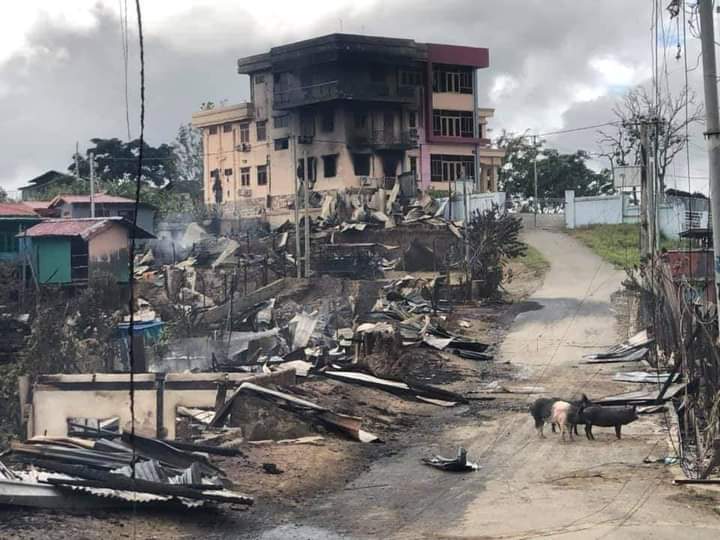“Not rich but happy” is the motto with which natives of Thantlang—a minor Chin State town in the valley of the Vuichip and Marau mountains on Burma’s border with India—used to welcome its guests.
That was until September 18, already known as the “Black Day” for Thantlang. On that day, bloody skirmishes between the military and local PDF groups had prompted the Tatmadaw to open fire on the town with heavy artillery. The military annihilated 19 houses and critically damaged many more. Cung Biak Hum, a local Baptist pastor who had been frantically extinguishing a blaze, was shot dead and later disfigured by soldiers who looted his corpse.
By the time the smoke had cleared, the vast majority of Thantlang’s residents had decided to abandon their land and property. Many thousands fled for their safety to nearby forests and villages, whilst others joined a growing exodus of Chin citizens granted temporary refuge in the Indian state of Mizoram.
But not everybody left Thantlang. “I saw the fake news reported in local media that residents from here had agreed to depart to allow the two forces to fight in the town”, says U Haa Tun (who agreed to be interviewed by DVB if referred to by a pseudonym), a 69-year-old Thantlang elder who chose to stay in place.
“It isn’t true; people wouldn’t abandon their houses without a very good reason! Truth is, they were extremely afraid of the fighting; some people didn’t even have enough time to pack. They left suddenly… but they want to return, of course!”
A resolute Haa Tun confirmed to DVB that, aside from himself, a total of 32 people—almost all children or elderly—remain in the town, taking refuge together in just a handful of buildings.
“Before the Black Day, fights had occurred sporadically, maybe once a week, every time the CDF [Chinland Defense Force] attacked military bases in the town. Because of this, I’ve always contemplated the current situation. I concluded that there will never be a good enough reason to leave my wife, my house and my land.”
According to Thantlang Placement Affairs Committee’s IDP Help group, 5,000 people had been forced to leave the township by clashes in the months preceding the bombardment of September 17. After the attacks, another 10,000 residents fled the town for Chin’s capital, Hakha, or for remote villages closer to the border; an ever-increasing number have chosen to cross into India to avoid burgeoning conflict in urban areas between the CDF-PDF alliance and the Tatmadaw. For Haa Tun, the merits of this current phase of the resistance are outweighed by the costs of battle.
“I already warned the CDF not to bring fights inside of the town for the safety of residents. And again, I want to tell them to please fight only in the jungle,” the elder said.
Despite Haa Tun’s warnings, resistance groups have been quick to surreptitiously return to the ghost town, eager to uproot the encroaching military. Yesterday, at least five military personnel were killed and scores injured after the CDF launched a new wave of guerrilla attacks. The nascent Chin State EAO announced that it stood firm in its pledge to attack those engaged in the stealing of public property.
“Let me say: because of this situation, many older people have died. As far as I know, four or five elderly have recently passed as a result of these battles,” he added.
According to Haa Tun, a meeting has been scheduled between the CDF and residents of Thantlang to discuss the safe return of refugees. It will not be easy; currently, around 100 soldiers are deployed in the township’s police station and surrounding hills.
Haa Tun says that, due to the exodus, those still living in the town have access to food supplies but are facing problems stemming from a cut in transportation services. Since the troubles began, only one bus leaves for the vital hub of Hakha—25 miles to the east of Thantlang— per day.
“It is impossible for the CDF to live without our residents who support them with food and supplies. That is why they too have left. I am neutral on the fighting, but I would like for our people to return home—despite the CDF in their current situation not being able to guarantee our safety,” Haa Tun concluded.
Almost all internet and phone services have been cut to Thantlang since September 23. This interview was only possible via a telephone call made on the MPT network.



